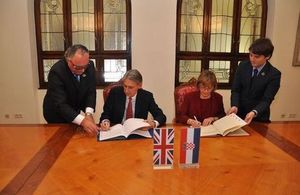Foreign Secretary Rt Hon Philip Hammond in Croatia
UK Foreign Secretary discussed EU reform, regional stability, energy, Russia on a visit to Zagreb.

UK Foreign Secretary Rt Hon Philip Hammond and Croatian Foreign Minister Vesna Pusić sign Double Taxation Agreement
The British Foreign Secretary, the Rt Hon Philip Hammond MP, visited Croatia on Thursday. He spoke to Prime Minister Zoran Milanović and Minister for Foreign and European Affairs Vesna Pusić. He also met a range of Croatian political figures, business people and other experts to discuss the future of Europe.
The visit of the Foreign Secretary came at an important time for Europe with the new European Commission and European Parliament in place. The UK is urging reform of the EU to make it fit for the 21st century and to ensure that it delivers more jobs and greater prosperity for all member states and all the people of Europe. We are working with our partners within the EU, including Croatia, to achieve it. Minister Hammond’s visit cements the close relationship between UK and Croatia. Mr Hammond’s predecessor, William Hague, came to Croatia in May 2013 – just two months before Croatia joined the EU – to congratulate the country on its successful accession process.
In Zagreb, Mr Hammond also discussed next steps on the EU’s recent initiative on Bosnia and Herzegovina, on which the UK and Croatia have already cooperated very closely.
During the visit, Hammond and Pusić signed the Double Taxation Agreement.
The new Agreement replaces the 1981 UK/Yugoslavia Double Taxation Convention which both countries are currently honouring. It generally follows the OECD Model Double Taxation Convention with important features including the following reduced withholding tax rates:
- dividends, from 15% to 10% for companies controlling less than 25% of the capital of the company paying the dividend, and for portfolio investors. For companies controlling more than 25% of capital the rate remains at 5%
- interest, from 10% to 5% generally and with a zero rate for banks
- royalties, from 10% to 5%.